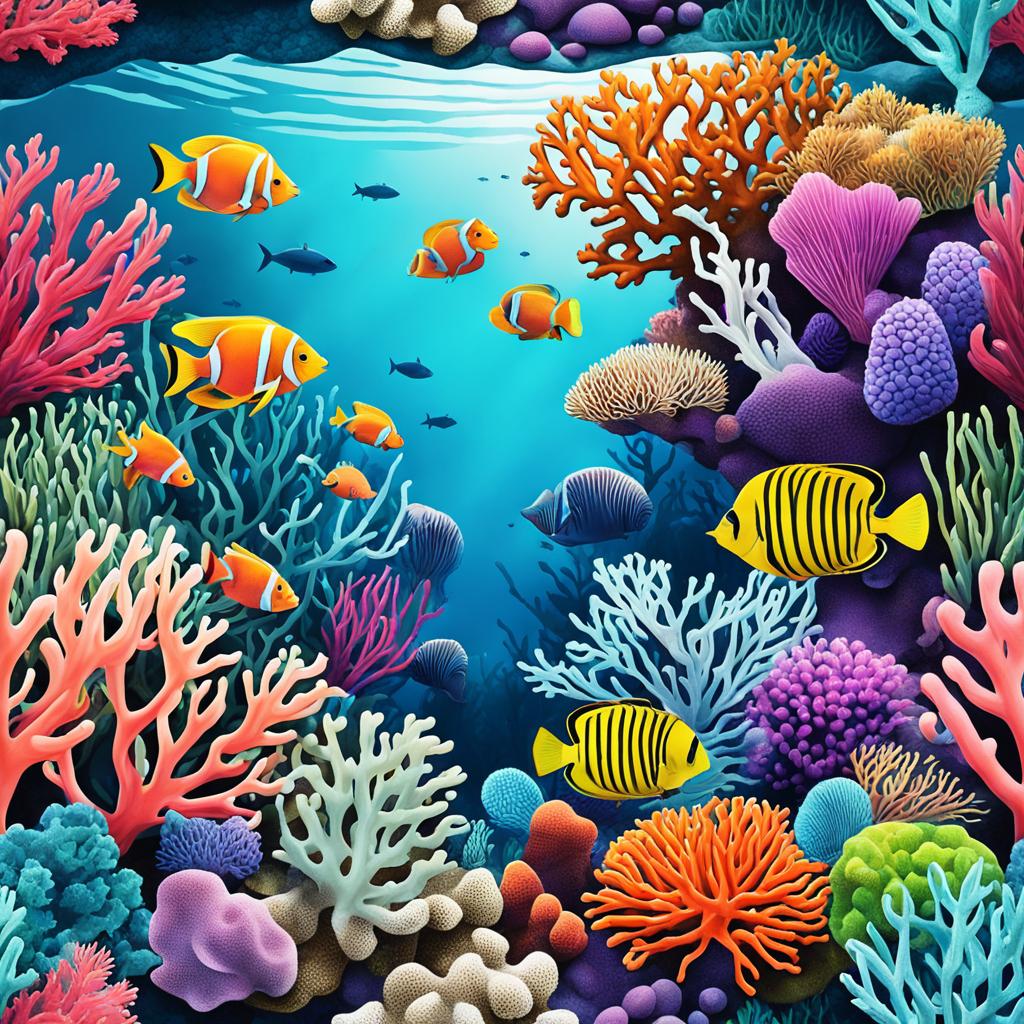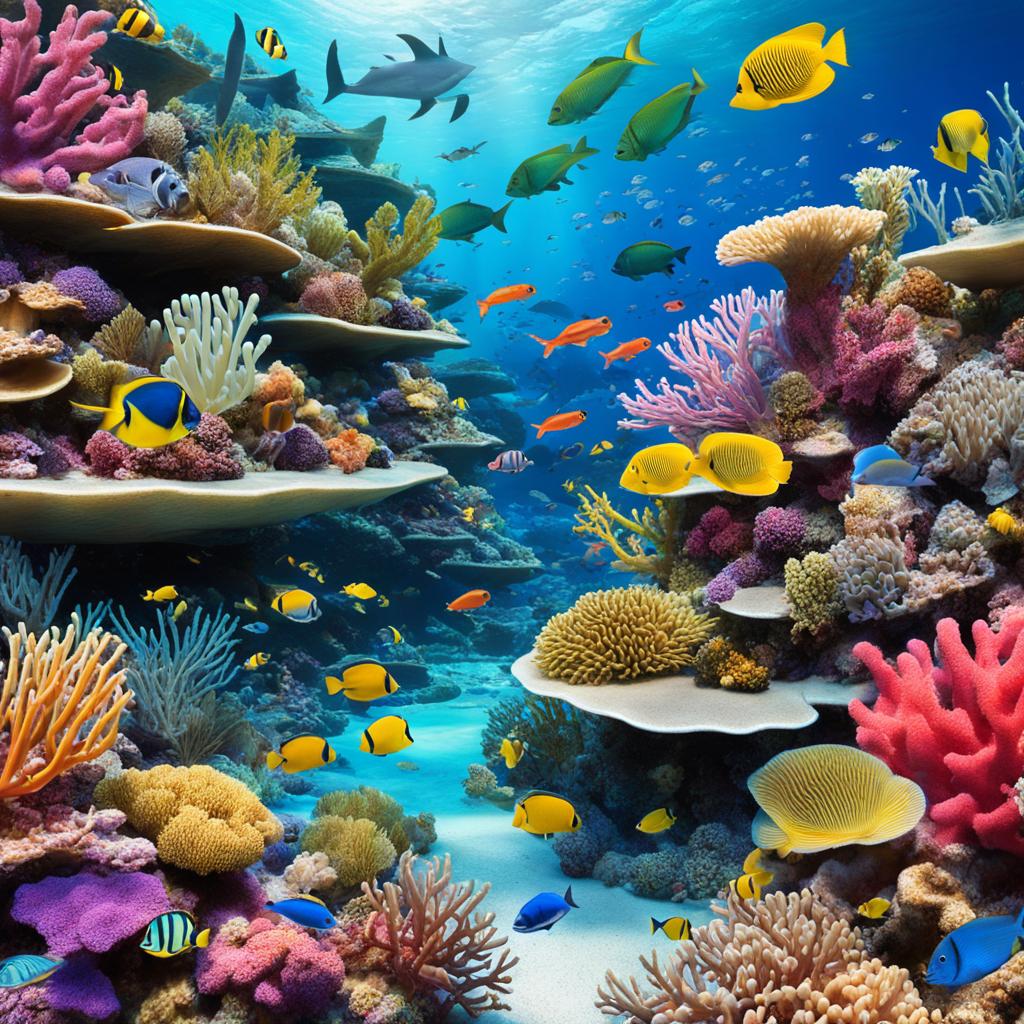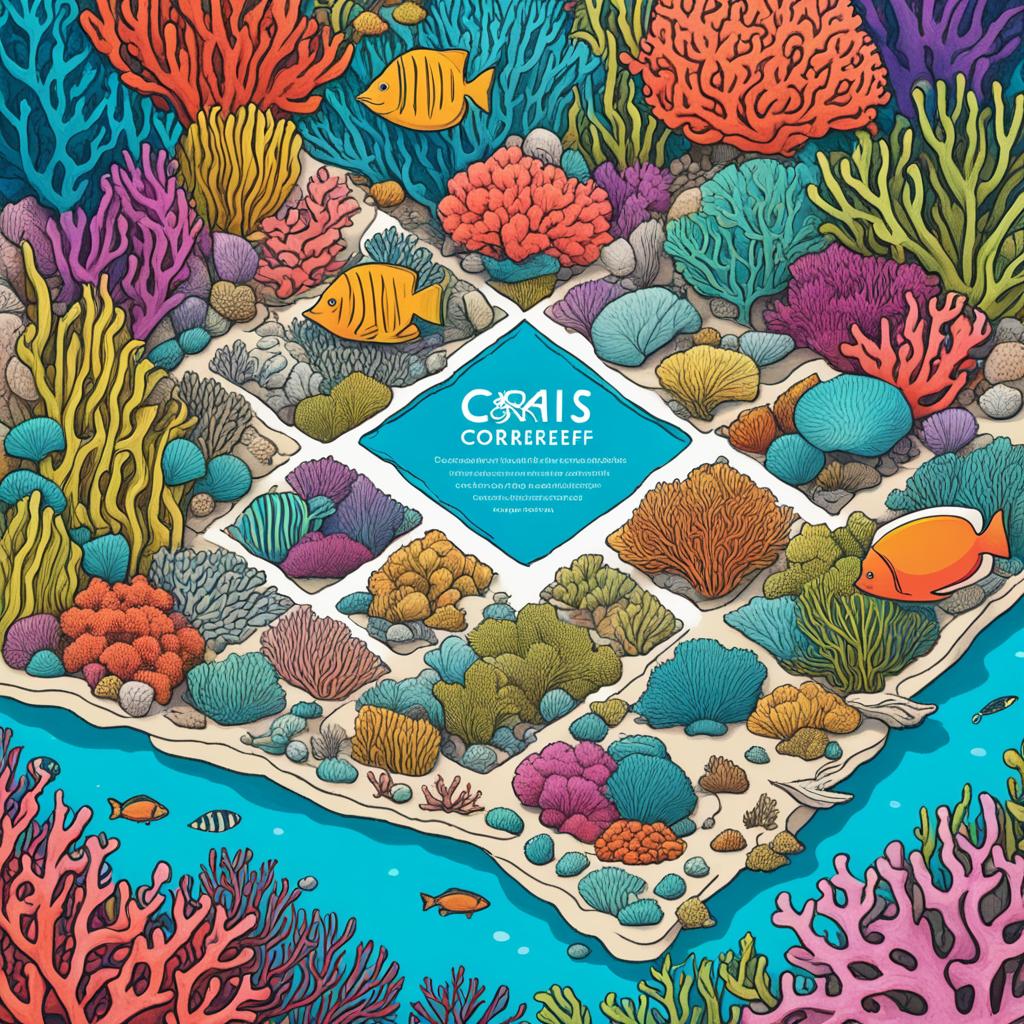Corals once covered an estimated 0.5% of the ocean floor. But now, they’re almost extinct due to climate change. Experts warn if we don’t act fast to cut greenhouse gas emissions, these vital marine ecosystems will vanish. The effect of climate change on coral reefs is an urgent global issue.
Scientific evidence shows human actions are causing climate change, which is destroying coral reefs. Our activities pump more greenhouse gases into the air, changing the ocean’s chemistry. This leads to warmer waters, more acidic oceans, and other harmful effects. As a result, coral bleaching and diseases are happening more frequently, weakening these ecosystems.
Coral reefs are key spots for biodiversity and offer many ecosystem benefits. They’re crucial for the lives of millions. We must quickly learn how to lessen climate change’s impact on them. This urgent environmental issue needs everyone to work together. Solutions include global action, new policies, and efforts from local communities.
Climate Change: A Severe Threat to Coral Reefs
In recent decades, our planet’s climate has changed a lot. The impact on coral reefs has been very devastating. This shift is mainly due to human activities that release greenhouse gases.
Scientific Evidence of Climate Change Impact
Research shows that even small temperature changes can harm corals. When corals are stressed, they lose their colorful algae and turn white. Unfortunately, coral bleaching events are happening too often now. For example, the Great Barrier Reef lost half of its corals in 2016 and 2017 because of this.
Greenhouse Gas Emissions and Ocean Warming
Burning fossil fuels has made the oceans keep more heat. From 1992 to 2019, the total heat in the oceans went up by 187 zettajoules. This warming is badly affecting coral reefs.
If we don’t reduce greenhouse gas emissions, by the end of the century, all 29 World Heritage coral sites could disappear. This situation is severe and urgent.


“Coral reefs directly support over 500 million people worldwide for daily subsistence, and their social, cultural, and economic value is estimated at US$1 trillion. Climate-related loss of reef ecosystem services could cost US$500 billion per year by 2100.”
We must act fast to protect coral reefs. Following the Paris Agreement is crucial. But, local problems like pollution and overfishing also need to be fixed. Everyone needs to work together to save these important marine areas.
Coral Bleaching: A Visible Consequence
The impact of climate change on coral reefs is a major worry. One big issue is coral bleaching. This happens when corals get stressed and push out the algae that give them food and color. As a result, they turn pale and become weak.
Mass Coral Bleaching Events
Over the last ten years, there have been lots of mass coral bleaching events. These big events have hurt coral reefs around the world. Places like the Great Barrier Reef in Australia and the Northwestern Hawaiian Islands saw their worst bleaching ever.
A small rise in ocean temperature, like 1-2°C over weeks, can start a bleaching event. If corals stay bleached for too long, they can die. This can damage whole reef systems.
Effects of Ocean Acidification
Rising carbon dioxide levels are also making the oceans more acidic. This change makes it hard for corals to build their skeletons. This is bad news for the health of our oceans.
Losing coral reefs hurts underwater life and ecosystems. The rich, diverse underwater world we love is at risk. This affects the food and lives of many people around the globe.


“Coral reefs are the canaries in the coal mine of our global ocean. Their decline is a blunt warning about the consequences of climate change for marine ecosystems and communities that depend on them.”
– Dr. Kim Cobb, Georgia Institute of Technology
Environmental Science: Studying Coral Reef Ecosystems
Coral reefs are incredible marine ecosystems with the most biodiverse wildlife on Earth. They are home to over a quarter of all marine fish species. Environmental scientists, marine biologists, and oceanographers study them closely. They use tools like satellites to track their health and any changes. This helps us see how climate change and human actions are affecting these vital habitats.
They are in 109 countries. Sadly, human activities have damaged or destroyed them in around 93 of these. These ecosystems mainly live in three key areas near the equator. For example, North America’s only barrier reef is not far from the Florida Keys. It stretches from Miami to the Dry Tortugas.
Scientists are examining how ocean acidification affects sea life, like clownfish. They are also checking how important coral reefs are for the environment. This work is key for saving these important ecosystems. There are many educational tools to help students and the public learn about their value.
By watching over coral reefs and checking their health, scientists get tons of important info. From 2014 to 2017, warm seas caused big harm to 70% of these ecosystems around the world. The Great Barrier Reef was hit hard, with miles of coral turning white. If the sea cools down soon enough, corals can bounce back. But it can take a long time for the whole reef to heal.


Coral reefs are very valuable. They bring in tens of billions of dollars a year and help over half a billion people. Mangrove forests and seagrass beds are also important for the big coral reef ecosystem. They are key places for marine life to start and grow. Keeping an eye on these ecosystems is very important. It helps protect them and the people who need them.
Economic and Ecological Value of Coral Reefs
Coral reefs are more than beautiful; they greatly help people around the globe. Over 500 million folks, mostly in poorer countries, depend on them for food and jobs. A study in 2014 found their value to be around a huge $1 trillion, counting both money and culture.
Biodiversity Hotspots and Ecosystem Services
Even though they cover less than 1% of the sea floor, coral reefs are home to about 25% of all ocean life. They do a lot for us, like being a source of food, protecting us from floods, and supporting fishing and tourism. If they were to disappear, it would hit hard on both the economy and people’s health and way of life.
Each year, coral reefs provide goods and services worth $2.7 trillion. Just one hectare of coral reef can give services worth from $130,000 to $1.2 million. These services are things like food, materials, climate control, and waste management.


Altogether, coral reef services are worth on average $172 billion every year. Protecting them makes a lot of sense money-wise. For example, in Vietnam, spending $1.1 million on mangrove planting saves $7.3 million a year in flood control.
“Coral reefs are the most vulnerable marine ecosystem to climate change.”
But, these essential places are in danger. They are threatened by climate change. Scientists say if we limit global warming to 1.5°C, about 90% of coral reefs could still vanish by 2050. The urgency is clear. We must act fast to save these vital pieces of our ecosystem.
Global Efforts to Combat Climate Change
Climate change is a challenge we must face together. The Paris Agreement, made in 2015, has a key goal. It wants us to keep the global temperature increase below 2°C, ideally below 1.5°C. Achieving this could lower carbon levels in the air, saving coral reefs.
The Paris Agreement’s goals should also match those of the Sustainable Development Goals (SDGs). The SDGs ask for quick action against climate change. They know protecting the environment is key for long-term development.
Paris Agreement and Sustainable Development Goals
The Paris Agreement and the SDGs are crucial in our climate fight. The Paris Agreement focuses on cutting greenhouse gases. It sets the aim of having no greenhouse gas balance by the second half of this century. Meanwhile, the SDGs offer a big plan for how we can develop in a way that’s good for the planet. They also have clear goals for fighting climate change and protecting the environment.
| Global Agreement | Key Objectives |
|---|---|
| Paris Agreement |
|
| Sustainable Development Goals |
|
Winning against climate change means everyone has to pitch in. Countries, companies, and people all need to work towards these goals. If we all focus our actions and decisions on these targets, we can start to beat climate change. And in doing so, we save our planet’s beautiful ecosystems, like coral reefs.


Local Pressures and Human Actions
Coral reefs face big problems because of human actions. Pollution, like chemicals that come from land, and physical damage hurt them too. Divers and some fishermen can step on coral by mistake, which breaks it. Or they might damage reefs by dropping anchors.
Pollution and Physical Damage
The world’s growing population needs more resources. This puts a heavy load on the environment. Our use of resources is exceeding what the Earth can renew. This is why there’s more pollution and physical damage to coral reefs.
Stuff like chemicals from farming and human waste end up in the sea. This hurts coral reef ecosystems. Divers and some fishermen can accidentally break the coral too. This makes life tough for coral and the animals that live in coral reefs.
“Humans have become so populous and our activities so damaging that we are now the dominant force of change on the planet.”
Human population growth and overconsumption are really hurting the planet. More people means we use up more resources. This is especially bad for places like coral reefs. It’s very important for us to change how we do things. We must take care of these marine homes for the future.
Coral Resilience and Adaptation Strategies
Climate change is a huge threat to coral reefs across the world. Yet, some corals are showing they can fight back. They are becoming more able to handle high heat by changing the type of algae they live with. This change helps them deal with the warmer water and more acidic ocean.
Researchers are finding these tough corals. They want to help them grow and put them back in the sea. Coral restoration techniques, like growing pieces in nurseries and then moving them back to the reefs, are being used. These methods help the corals recover quickly. Scientists are also trying to breed corals that can handle the heat better.
Thanks to these efforts, there is hope for coral reefs. But, it’s not just up to the corals to beat climate change. We all need to work together to stop climate change. This means reducing the things that cause climate change, like greenhouse gases.
“By 2050, bleaching is predicted to become an annual occurrence on most coral reefs, leading to a potential extinction or near extinction of many coral species. Only 10% of the world’s reefs are expected to persist by 2050 in the face of climate change impacts.”
Scientists are finding ways to help corals survive. But the fight is far from over. We all need to act, both worldwide and in our own areas, to help coral reefs live on.
NASA’s Role in Monitoring and Protecting Coral Reefs
Coral reefs are key ecosystems, offering food and protection along coastlines. They also bring economic benefits to over 500 million globally. Yet, climate change poses a big risk. NASA is at the forefront, using satellites and planes to watch over coral reefs.
Satellite and Airborne Missions
NASA’s satellites, including Landsat 8, gather vital data on coral environment. They check ocean temperatures and the water’s health. This helps scientists spot changes in the coral and aids in their protection.
NASA goes beyond just satellites. It uses drones with cameras to look at coral reefs closely, even in cloudy, tropical areas. This gives scientists a detailed view of coral health and any problems.
NASA shares its many years of space data and environmental watch knowledge with scientists worldwide. This helps in research and work to save coral reefs everywhere.
“Satellite data helps natural resource managers and scientists take action to protect coral reefs before bleaching occurs.”
By offering the newest data on coral reefs, NASA is a big help in saving these unique natural places. They are working to keep them for the next generations to enjoy.
The Urgent Need for Action
The future of our coral reefs is at risk because of climate change. If we don’t act fast, many corals could disappear. We must lower our greenhouse gas emissions to save them.
Some coral species are trying to adapt, but it’s not enough. Human activities are putting too much pressure on them. The IPCC warns that we need to reduce harmful gas emissions. But we haven’t seen much change yet.
The IPCC’s latest report says we need to take big steps for a better future. If we act fast to cut emissions, we could avoid very serious effects of global warming. But time is running out. We need to act now.
| Statistic | Value |
|---|---|
| Increase in global temperatures above pre-industrial levels | 1.1°C |
| Reduction in greenhouse gas emissions needed by 2030 to limit warming to 1.5°C | Nearly 50% |
| Increase in public financial support for fossil fuels among G20 countries between 2019 and 2022 | $1.4 trillion |
We have to act quickly to protect our coral reefs and ecosystems. It’s up to governments, businesses, and everyone to cut down on emissions. We also need to use more renewable energy and protect the environment. This is the only way we can secure a good future.
“The IPCC’s synthesis report highlights the urgent need for ambitious action to secure a livable sustainable future for all.”
Conclusion
Coral reefs are very precious but also face big dangers. These come from climate change. There’s a lot of proof showing that human activities are the main problem. These include pollution and overfishing.
It’s super important to save and fix coral reefs. This affects many parts of life, like the economy and traditions. People who study the environment and work to protect it play a key role. They come up with ways to fight climate change.
Protecting coral reefs is essential for our future. We need to all help in fighting climate change. This way, we can keep these amazing places alive for our kids and their kids.
Source Links
- https://oceanservice.noaa.gov/facts/coralreef-climate.html
- https://climate.nasa.gov/explore/ask-nasa-climate/3290/vanishing-corals-part-two-climate-change-is-stressing-corals-but-theres-hope/
- https://www.un.org/en/chronicle/article/impacts-climate-change-coral-reefs-and-marine-environment
- https://www.iucn.org/resources/issues-brief/coral-reefs-and-climate-change
- https://www.vox.com/climate/24137250/coral-reefs-bleaching-climate-change
- https://scied.ucar.edu/learning-zone/climate-change-impacts/corals-and-climate
- https://www.coris.noaa.gov/activities/reef_managers_guide/reef_managers_guide_ch4.pdf
- https://www.marineconservation.org.au/coral-bleaching/
- https://reefresilience.org/stressors/bleaching/bleaching-impacts/
- https://sanctuaries.noaa.gov/education/teachers/coral-reef/lesson-plans.html
- https://www.noaa.gov/education/resource-collections/marine-life/coral-reef-ecosystems
- https://www.reefrelief.org/learn/coral-reef-ecosystem/
- https://www.unep.org/topics/ocean-seas-and-coasts/blue-ecosystems/coral-reefs
- https://www.sciencedaily.com/releases/2009/10/091016093913.htm
- https://www.vaia.com/en-us/explanations/environmental-science/environmental-research/coral-reef-ecology/
- https://www.cfr.org/backgrounder/paris-global-climate-change-agreements
- https://www.un.org/sustainabledevelopment/climate-change/
- https://www.planete-energies.com/en/media/article/international-efforts-combat-climate-change
- https://populationconnection.org/resources/human-activities-and-climate-change/
- https://www.ncbi.nlm.nih.gov/pmc/articles/PMC33230/
- https://en.wikipedia.org/wiki/Human_impact_on_the_environment
- https://coral.org/en/coral-bleaching/the-future-of-corals/
- https://www.mdpi.com/2673-1924/4/1/2
- https://new.nsf.gov/news/environment-influences-corals-resilience
- https://climate.nasa.gov/explore/ask-nasa-climate/3273/vanishing-corals-part-one-nasa-data-helps-track-coral-reefs
- https://www.nesdis.noaa.gov/news/heres-how-satellites-play-pivotal-role-monitoring-the-health-of-coral-reefs
- https://www.nesdis.noaa.gov/news/preserving-our-coral-reefs
- https://www.theguardian.com/environment/2023/mar/20/ipcc-climate-crisis-report-delivers-final-warning-on-15c
- https://www.ccacoalition.org/content/why-we-need-act-now
- https://www.nature.com/articles/d41586-023-02686-3
- https://nap.nationalacademies.org/read/5756/chapter/7
- https://www.mrgscience.com/ess-ia-results-analysis–conclusions.html
- https://unity.edu/environmental-careers/why-study-environmental-science/
